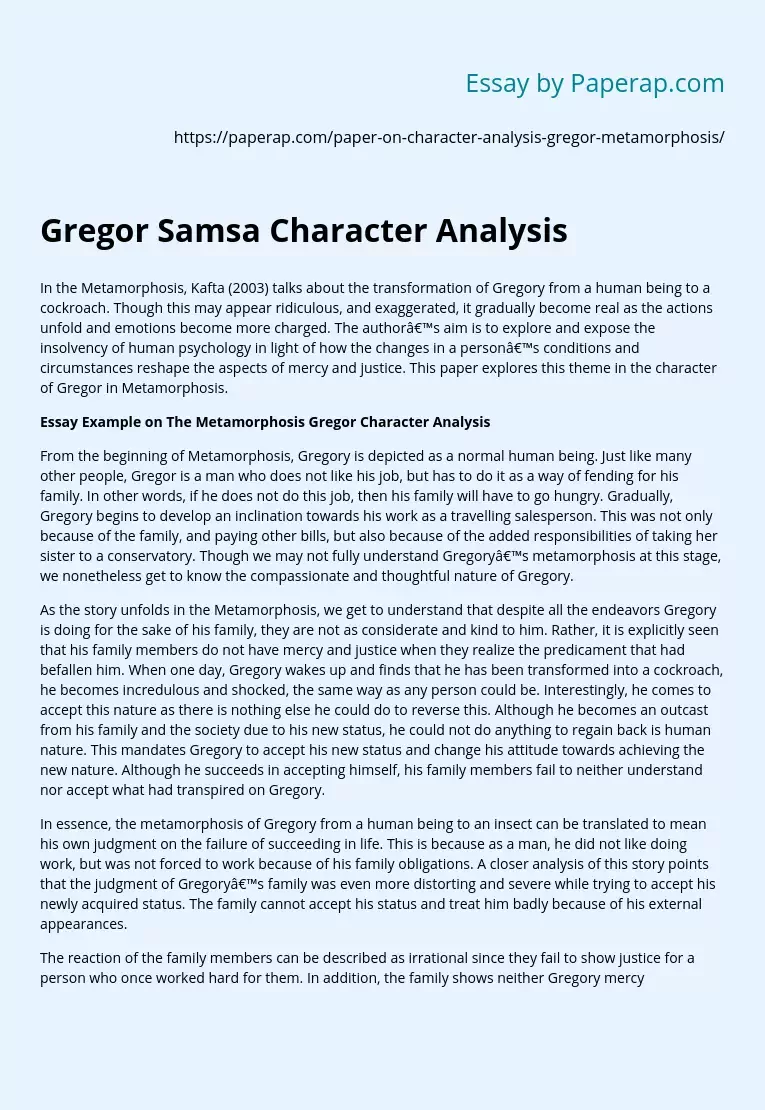Gregor Samsa Character Analysis
In the Metamorphosis, Kafta (2003) talks about the transformation of Gregory from a human being to a cockroach. Though this may appear ridiculous, and exaggerated, it gradually become real as the actions unfold and emotions become more charged. The author’s aim is to explore and expose the insolvency of human psychology in light of how the changes in a person’s conditions and circumstances reshape the aspects of mercy and justice. This paper explores this theme in the character of Gregor in Metamorphosis.
Essay Example on The Metamorphosis Gregor Character Analysis
From the beginning of Metamorphosis, Gregory is depicted as a normal human being. Just like many other people, Gregor is a man who does not like his job, but has to do it as a way of fending for his family. In other words, if he does not do this job, then his family will have to go hungry. Gradually, Gregory begins to develop an inclination towards his work as a travelling salesperson.
This was not only because of the family, and paying other bills, but also because of the added responsibilities of taking her sister to a conservatory. Though we may not fully understand Gregory’s metamorphosis at this stage, we nonetheless get to know the compassionate and thoughtful nature of Gregory.
As the story unfolds in the Metamorphosis, we get to understand that despite all the endeavors Gregory is doing for the sake of his family, they are not as considerate and kind to him. Rather, it is explicitly seen that his family members do not have mercy and justice when they realize the predicament that had befallen him.
When one day, Gregory wakes up and finds that he has been transformed into a cockroach, he becomes incredulous and shocked, the same way as any person could be. Interestingly, he comes to accept this nature as there is nothing else he could do to reverse this. Although he becomes an outcast from his family and the society due to his new status, he could not do anything to regain back is human nature. This mandates Gregory to accept his new status and change his attitude towards achieving the new nature. Although he succeeds in accepting himself, his family members fail to neither understand nor accept what had transpired on Gregory.
In essence, the metamorphosis of Gregory from a human being to an insect can be translated to mean his own judgment on the failure of succeeding in life. This is because as a man, he did not like doing work, but was not forced to work because of his family obligations. A closer analysis of this story points that the judgment of Gregory’s family was even more distorting and severe while trying to accept his newly acquired status. The family cannot accept his status and treat him badly because of his external appearances.
The reaction of the family members can be described as irrational since they fail to show justice for a person who once worked hard for them. In addition, the family shows neither Gregory mercy nor empathy on his changed condition. The family reaches a point where they fail to relate the new nature of Gregory with the one they once knew. While in literal sense, Gregory is the one who is supposed to be dehumanized, the dehumanization of his parents and sister, Grete, both psychological and physical, appear to be more severe and profound.
Reference
Kafka, F (2003). The Metamorphosis. New York: Crown.
Gregor Samsa Character Analysis. (2019, Nov 27). Retrieved from https://paperap.com/paper-on-character-analysis-gregor-metamorphosis/

